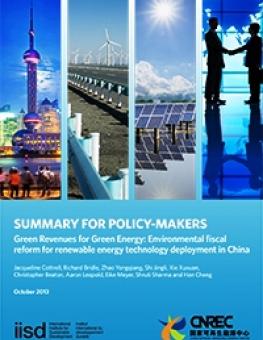
Green Revenues for Green Energy: Environmental fiscal reform for renewable energy technology deployment in China
China's economy continues to grow rapidly with corresponding increases in both energy consumption and environmental pollution.
Renewable energy is a key part of China's response to this challenge. The current costs of measures to facilitate the large-scale deployment of renewable energy are primarily met through an electricity surcharge—effectively a tax on electricity consumption. However, concerns have been raised that continuing to rely on the surcharge alone places a disproportionate burden on electricity consumers. In response, the need for further debate on how best to fund renewable energy and reduce environmental pollution was identified by the IISD and the CNREC, leading to the establishment of a research project to examine the international experience of similar schemes and their relevance to China. This report presents a summary for policy-makers of the findings of that research.
You might also be interested in
At the Crossroads: Balancing the financial and social costs of coal transition in China
The global decline of the coal industry has led to job losses and mine closures. As Shanxi in China considers how to create new employment in a coal dependent region we review international experience of the tranistion away from coal.
Heatwaves to hit China once every 5 years as global extreme weather events multiply, study finds
Record-breaking heatwaves that have scorched North America, Europe and China are set to worsen in future unless the world stops burning fossil fuels, according to a study by the World Weather Attribution (WWA) academic initiative.
Transition from fossil fuels to renewable energy can pose fiscal challenges for India: study
The global transition away from fossil fuels to renewable energy sources could trigger financial challenges for India and major developing countries such as Russia, Brazil and China because of their high dependence on revenues from fossil fuel, according to a study by the International Institute for Sustainable Development (IISD).
IISD Report: Shifting Away from Fossil Fuels Could Lower BRIICS Nations' Revenues
A new report by the International Institute for Sustainable Development (IISD), titled Boom and Bust: The Fiscal Implications of Fossil Fuel Phase-Out in Six Large Emerging Economies, looks at the potential financial ramifications of phasing out fossil fuels in six emerging economies — Brazil, Russia, India, Indonesia, China, and South Africa (BRIICS). They must begin adjusting their fiscal policies to account for declining fossil fuel use or risk a $278 billion revenue gap by 2030.